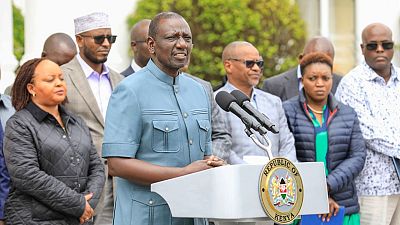Kenya
Kenya's parliament has instituted a ban on the iconic Kaunda suit, named after the late Zambian President Kenneth Kaunda, within its premises.
Speaker of Parliament Moses Wetangula says both Kaunda suits and traditional African attire were no longer permissible.
Notably, Kenyan President William Ruto frequently dons the Kaunda suit during official events, contributing to its popularity among the political elite not only in Kenya but also in some parts of Africa.
The Kaunda suit, characterized by a safari jacket and matching trousers, draws its name from the Zambian president, who played a pivotal role in making it a fashion.
Speaker Wetangula attributed the ban to emerging fashion trends that posed a challenge to the established parliamentary dress code.
He emphasized a prescribed dress code for men, including a coat, collar, tie, long-sleeved shirt, long trousers, socks, shoes, or service uniform. For women, the guidelines specify business, formal, or smart casual wear with skirts and dresses below knee-length and sleeveless blouses prohibited.
Acknowledging the past tolerance of the Kaunda suit in parliament, Wetangula emphasized the need to halt this practice to preserve the parliamentary dress code. The Kaunda suit gained recent attention on social media in Kenya due to President Ruto's frequent appearances in it during official functions.
The ban has stirred mixed reactions on social media, with some questioning the prohibition of an African attire in an African parliament, while others express support.













![Senegal stun Morocco in AFCON 2025 final to retain continental crown [Football Now]](https://images.euronews.com/articles/stories/09/61/76/30/320x180_cmsv2_64f668d8-9f3a-50c3-9477-243de96f35d5-9617630.jpg)
Go to video
AFCON 2025: Who is leading the Golden Boot race?
Go to video
Uganda’s election internet blackout meets Tanzania’s warning
Go to video
Uganda elections chief says he faces threats over vote outcome
Go to video
Uganda: Civil society under strain - who watches the vote?
Go to video
Uganda denies plans for election internet shutdown
Go to video
Lions, Eagles and more: AFCON 2025 teams and their nicknames